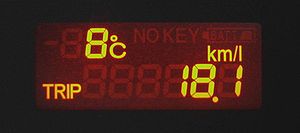 Image via Wikipedia
Image via Wikipedia
Here's a comparison from Car and Driver mag (July 2009 issue, page 34)...
Nissan Murano vs. Mazda CX-7. Roughly same class of cross-over, yes?
Nissan: 3.5L V6, 265 HP, 248 LB-FT
Mazda: 2.3L Turbo I4, 244 HP, 258 LB-FT
Nissan enjoys a bit more HP, but Mazda gets more torque. However, keep in mind that there is a little bit of turbo lag for the Mazda, so Nissan should be peppier in city speeds. But let's call it equal.
Nissan: EPA 18/23, C/D observed: 23 MPG
Mazda: EPA 16/22, C/D oberved: 20 MPG
So the Mazda actually consumed MORE fuel on the average, despite having a smaller engine. Isn't that interesting?
C/D also shown that BMW 328i, with 3.0 I6, is more frugal than an Audi A4 2.0T /Quattro, which is a turbo 2.0L I-4. And MB S550 with 5.5 V8 gets better combined mileage than BMW 750Li, which has a twin-turbo 4.4 V8.
In fact, Ford had went on and admitted that their "EcoBoost" turbo 4's should get same fuel-economy ratings than the current unboosted V-6's.
And this is despite that fact that a turbo 4 should be LIGHTER than a V6, enjoys turbo lag (though that's reduced in modern turbos), has less torque band, will probably run hotter, and probably requires premium fuel.
So why should you buy a smaller engine that gets WORSE fuel economy (or at least, "no better"), than current V6's and V8's?
![Reblog this post [with Zemanta]](http://img.zemanta.com/reblog_e.png?x-id=ed7dec93-cff2-4565-8961-c8f1a7925437)
No comments:
Post a Comment